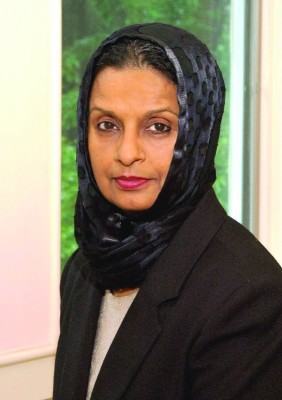Chaplain Recounts Afghan Suffering
In the mud huts of a vast refugee camp, Afghan women pleaded for food. In a decrepit hospital, mothers pressed feverish babies into her arms, seeking money for medicine. In the streets of her hometown of Karachi, Pakistan, beggars offered her a day’s work for a single meal.
Sister Shamshad Sheikh had come face to face with the poverty and desperation that decades of war had wreaked on Afghanistan.
When Sheikh, the College’s Muslim adviser, boarded a flight to Pakistan on Christmas Day, her intention was to meet with Afghan women, learn about their suffering, and try to find a way to help. “This trip was very successful. I was able to do what I wanted to do. I was able to meet those women, and hear from them, and talk to them,” she said.
Her first stop was Karachi. From there, she traveled to the border city of Peshawar, where she was invited into the home of a family friend.
Prevented by security forces from crossing the border into Afghanistan, Sheikh visited the Kacha Garhi refugee camp on the outskirts of Peshawar, where an estimated 150,000 people find shelter in crude mud huts. Kacha Garhi was formed twenty years ago, when thousands of refugees poured through the Khyber Pass after Soviet troops invaded Afghanistan.
The flow of refugees has not stopped. In her visits, Sheikh met women who told of fleeing Kabul over the past several years, driven out by the harsh regime of the Taliban. In the camps live “the poorest of the poor,” Sheikh said. Each hut contains a common room, ringed by several smaller rooms, each of which houses a family. Some families have a dozen or more children. Although she visited during lunchtime, Sheikh neither saw nor smelled food.
Over and over, Sheikh heard the same pleas – for money, for food, for decent schools. While the mass media have created the impression that Afghan women most want to throw off the burqua, the head-to-toe covering they were forced to wear by the Taliban, it is education for their children for which they are most desperate, she says.
In a dusty, crumbling hospital, dozens of women waited in line to have their children seen by the only doctor on duty. When Sheikh appeared, the women swarmed around her, taking her for a doctor. “They all started running after me—‘Look at my baby!’ They were taking their babies’ clothes off—‘Look at all these rashes here! Give me some medicine.’ And I kept saying ‘I’m not a doctor, I’m not a doctor,’ ” Sheikh said. “I was trying to be brave, and trying to show my love, so I said, ‘Give me your baby, I’ll hold her.’ And the baby had a fever, burning, that baby.”
Sheikh had brought with her $2,000 in donations from local churches and individuals, to which she added another $1,000 of her own funds. Against the advice of the local office of the United Nations refugee agency, she began doling out small sums in cash when her offers of food and clothing were met with pleas for money. By the time her return flight left the ground in early January, she had not even enough money left for a cup of coffee.
Sheikh hopes to return to the refugee camps across the border in Afghanistan. Until then, she will use what she has learned in plotting out her next steps in aiding the refugees.
What she learned is “going to reflect on every step of my life,” Sheikh says. “Be thankful to God for what you have. We forget that.”




